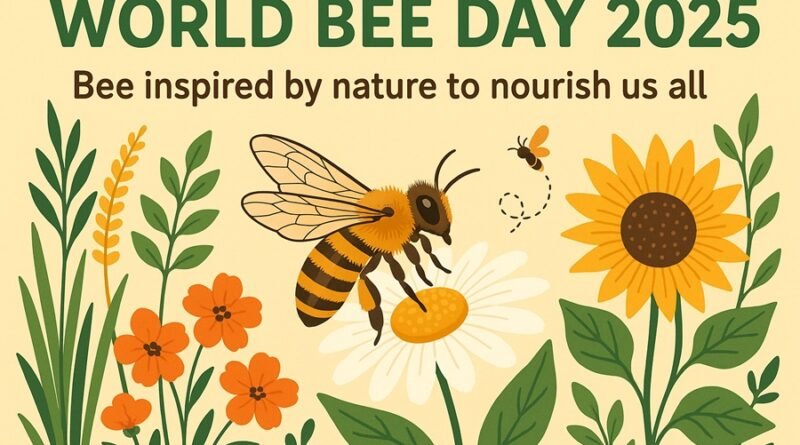Essay on World Bee Day 2025 Theme: “Bee Inspired by Nature to Nourish Us All”
Every year on May 20, people across the globe come together to celebrate World Bee Day, an international observance that highlights the essential role of bees and other pollinators in sustaining life on Earth. The theme for World Bee Day 2025 is “Bee Inspired by Nature to Nourish Us All,” and it carries a message of urgency and hope.
This essay explores the meaning behind this theme, its relevance in today’s world, and the steps we can take to ensure that bees continue to nourish ecosystems and humanity alike.
The Significance of World Bee Day
World Bee Day is observed on May 20 in honor of Anton Janša, a pioneer of modern beekeeping born in Slovenia in 1734. The United Nations established this day to raise awareness about the importance of pollinators, the threats they face, and their contribution to sustainable development.
Bees are responsible for the pollination of more than 75% of global food crops, including fruits, vegetables, nuts, and oilseeds. Without bees, much of our diet would vanish, and ecosystems would collapse.
Understanding the 2025 Theme: “Bee Inspired by Nature to Nourish Us All”
This year’s theme is both poetic and powerful. “Bee Inspired by Nature to Nourish Us All” urges us to look at how bees live in harmony with their environment. Bees work collectively, follow natural rhythms, and give back to nature far more than they take.
The phrase “Bee Inspired” is a call to emulate the behavior of bees: working together, respecting nature’s limits, and contributing to the well-being of others.
The phrase “to Nourish Us All” emphasizes that when bees thrive, they help nourish not just people, but entire ecosystems.
World Bee Day vs World Honey Bee Day
World Bee Day, celebrated on May 20, is a global initiative led by the United Nations to raise awareness about the vital role of bees and other pollinators in supporting biodiversity, food security, and environmental sustainability. It commemorates the birth of Anton Janša, a pioneer of modern beekeeping, and emphasizes the urgent need to protect bees from threats like habitat loss, pesticides, and climate change. On the other hand, World Honey Bee Day, observed on the third Saturday of August, primarily recognizes the importance of honey bees and honors the contributions of beekeepers, especially in regions like India where apiculture supports rural livelihoods and natural farming. While both days advocate for pollinator conservation, World Bee Day is globally inclusive of all pollinators, whereas World Honey Bee Day focuses specifically on the honey bee and its economic and ecological value.
How Bees Nourish Us
✅ 1. Pollination and Food Security
Bees help pollinate nearly one-third of the food we eat. Apples, almonds, tomatoes, coffee, and many spices rely heavily on bee pollination. Their services ensure quality, quantity, and variety of crops.
✅ 2. Environmental Balance
Bees maintain the diversity of plants, which in turn supports wildlife, improves soil health, and enhances climate resilience. They are keystone species in many ecosystems.
✅ 3. Livelihoods and Economies
Beekeeping supports millions of livelihoods, especially in rural areas. In many countries like India, honey bees are also integrated into organic farming and tribal economies.
Threats to Bees: A Global Crisis
Despite their importance, bees are in decline. The 2025 theme serves as a reminder that the forces threatening bee populations must be addressed urgently:
- Pesticide exposure reduces bee immunity and kills colonies
- Climate change disrupts plant-bee relationships and foraging patterns
- Habitat destruction limits food and nesting sites
- Diseases and invasive species further weaken bee resilience
- Pollution—including microplastics and EM radiation—affects bee orientation and breeding
Without intervention, these threats could undermine food systems and ecological health worldwide.
🌱 Be Inspired by Nature: What We Can Learn from Bees
Bees are models of sustainability, efficiency, and community. They gather only what they need, avoid waste, and support one another through cooperation.
By observing bees, humans can learn:
- To value interdependence and biodiversity
- To adopt natural farming methods
- To reduce chemical usage and ecological harm
- To respect seasonal cycles and limits of the environment
This theme challenges us to move away from industrial models of agriculture that harm pollinators and toward nature-based solutions.
🌼 Actionable Steps Inspired by the 2025 Theme
🌺 1. Create Pollinator Gardens
Planting native flowers, herbs, and shrubs provides bees with nectar, pollen, and shelter.
📚 2. Raise Awareness
Organize school programs, community talks, or social media campaigns using the World Bee Day theme.
🧑🌾 3. Promote Sustainable Agriculture
Encourage farmers to reduce pesticide use, grow diverse crops, and preserve local flora.
🛍️ 4. Support Ethical Honey Brands
Buy local, organic, or certified honey to support eco-friendly beekeeping practices.
🏛️ 5. Push for Policy Change
Advocate for pollinator protection in government schemes, urban planning, and education.
🌎 Global and Local Impact
Organizations like the United Nations FAO, Apimondia, and national agricultural boards have taken strong initiatives in supporting bees through research, funding, and public outreach. However, the success of these initiatives depends on participation from citizens, farmers, students, educators, and policymakers.
Explore Articles:
✨ Conclusion: Bees Show Us the Way
The 2025 theme, “Bee Inspired by Nature to Nourish Us All,” is not just a slogan—it is a vision for the future. It encourages us to see bees not as tiny creatures, but as mighty teachers. They show us how to live with purpose, give back to the earth, and build a world that sustains everyone—plants, animals, and people alike.
If we protect bees, we protect life itself.

